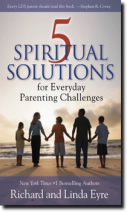Can a weekly allowance add up to spoiled, entitled kids? Our experts dive into the debate and offer alternatives to help you manage kids and money.
Richard and Linda Eyre explain the pitfalls of giving kids an allowance and offer solutions that work.
Allowances: The Problem and the Opportunity
We had just finished a parenting presentation to a very affluent group of parents where we had focused on teaching responsibility. An excited father came up afterwards and said he had been so moved by our message that he had decided, right there on the spot, to sell his big home in the city and move his family to a rural farm where there were “cows and chickens and eggs and crops so that my kids can have some real responsibility.”
Why do we assume that urban or suburban lifestyles and a reasonable amount of wealth and comfort have to work against our parenting and against our kids’ chances of learning responsibility? We suggested to the dedicated dad that he think about it for a while, and that he consider some specific ways that he might teach initiative and responsibility just as well in an urban or suburban environment, using money and a “family economy” as his vehicles, rather than farm chores. Maybe money is actually as good a “raw material” for discipline and delayed gratification as are chickens or cows! After all, money can be earned, budgeted, saved, given, and managed, and together, those abilities make up a pretty good definition of responsibility.
Having said that, money certainly can, and often does work against responsibility in our kids, because of the way we handle it, and the way we give it to our kids.
Let me (Richard) share an experiences that illustrates the problem:
It is a day I remember well, because it was the first day that I realized that “allowances” were working against us and that money was helping me spoil my kids much more than it was helping me teach them anything. It was a Saturday morning, and I was trying to catch up a little on sleep. I was awakened by loud knocking on the locked bedroom door. Groggily, I got up and opened it to find three little kids with their hands out saying “Gimme my money, gimme my money, its allowance day.” To my sleepy eyes, it all looked a bit like a welfare line. I had just opened the window, and here were the people with their hands out, collecting the dole!
We had created an economy in our house all right, but it was an entitlement economy! My kids, I realized in that brief epiphany, saw no connection between performance and reward, they perceived no real ownership in the money we gave them or the things they bought with it, and they were learning the antithesis of initiative and responsibility rather than the essence of it.
Over the next several months, we worked with some other parents who had some of the same concerns, and developed what we started to call “the free enterprise family economy” with the goal of creating something of a microcosm of a real workplace and market in each of our homes and better preparing our kids to handle the real economic world some day, and to be more responsible and motivated in our own world in the meantime.
Family Economy
The “family economy” has since been tried and perfected by thousands of other parents, and has proven to be a surprisingly fun way to give young children the sense of “ownership” that is always a prerequisite for even the most basic forms of responsibility.
Institutions that last always have some kind of an economy that allows responsibility to be shared so that individuals feel both membership and motivation based on the fact that they do part of the work and share in the earned rewards.
Learn about Richard and Linda Eyre’s new book, “5 Spiritual Solutions to Everyday Parenting Challenges”, and register for book giveaways at www.valuesparenting.com
New York Times #1 Bestselling Authors Richard and Linda Eyre are the parents of nine children and, by coincidence, the authors of 9 internationally distributed parenting and life-balance books. They lecture throughout the world on family related topics, and are the founders of Joyschools.com. Visit the Eyres anytime at www.TheEyres.com or www.valuesparenting.com















Add comment